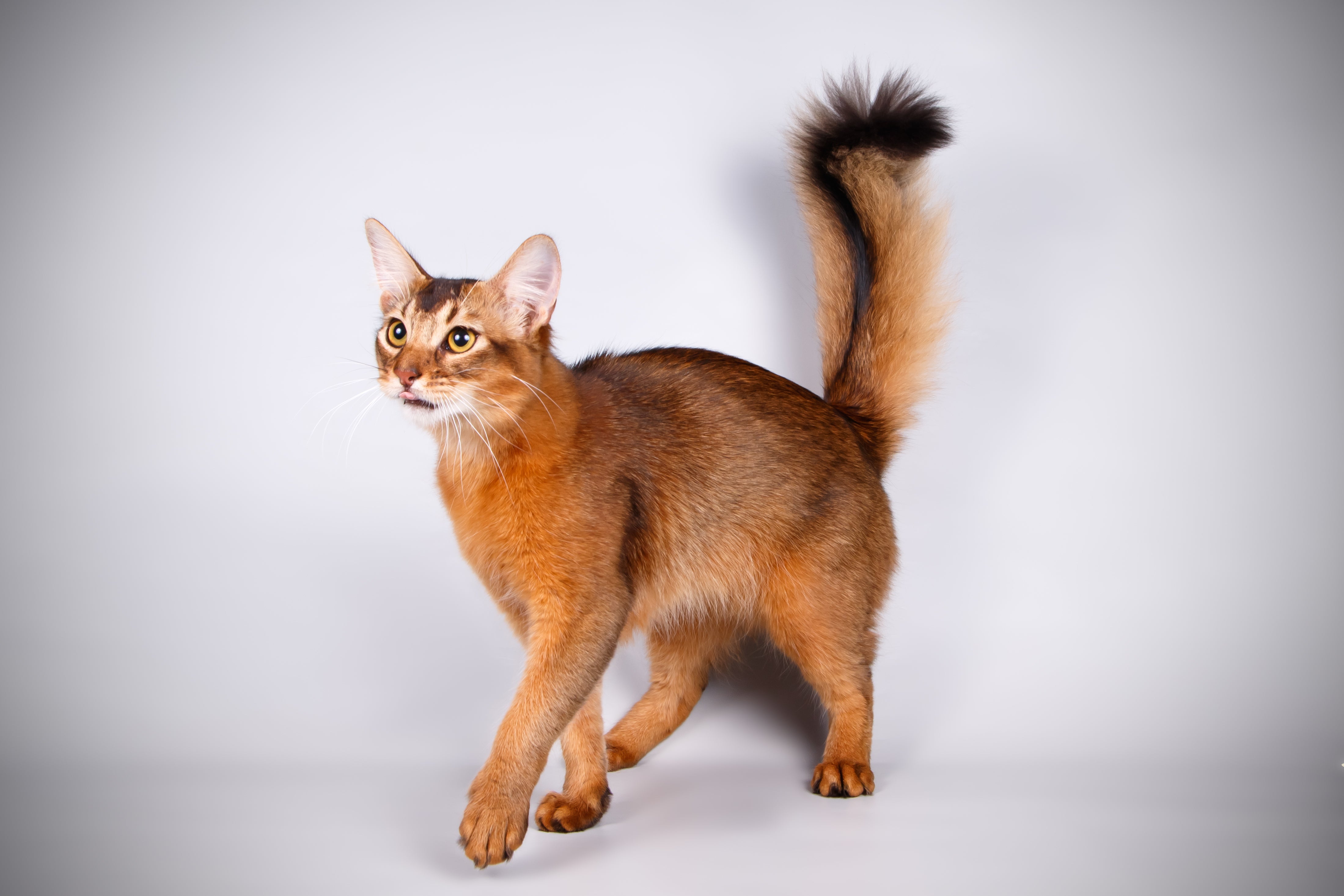Somali
The Somali cat is alert, lively, mischievous, and high-energy. They are muscular, lithe, and active, closely related to the Abyssinian. A wedge-shaped head and large, almond-shaped gold, amber, or green eyes give them an innocent look; however, they are whirling dervishes in cat form, ready to investigate. They are semi-longhaired cats with short fur to the body and longer fur around the neck, legs, and tail. The fur is “agouti,” which means each hair has several bands of color on it, giving it a shaded appearance.
Breed characteristics carousel
Learn More
Need to Know
- Benefits from an experienced owner
- Needs a high level of enrichment
- Highly active and inquisitive cat
- Independent but friendly
- Very talkative cat
- Average build cat breed
- Requires grooming once a week
- Needs extensive outdoor space
- Not ideal for family homes
- Can be regularly left for a few hours
- Needs a calm environment

Personality
Somali cats are animated, funny, and playful cats that often get up to no good. They love to play fetch, dissect things, bite, chase, and stay very active, hinting at their ancestry as wild African cats. These high-spirited cats have soft voices, active minds, and voracious appetites. Determined and stubborn, they like to see their cat ideas through, even if that means knocking something off the kitchen cabinet at 4 am. They’re not cuddlers and prefer to be near, not on top of, their owners. They show love by being involved in every aspect of an owner’s life—if you open a drawer to look for something, chances are their paws will be right there with your hands.
Descended from the Abyssinian, one of the oldest domesticated cats, the Somali was first brought to Europe in the mid-19th century by British soldiers from modern-day Ethiopia. Refined in Britain, they came to America in the early 1900s and became a favored breed for their unique personalities and striking looks.
If you have a sense of humor and are OK with things being pushed off counters frequently, then a Somali Cat is for you. They consider themselves wild cats, so owners will need to put up with their wild behaviors. They love jumping, climbing, and lounging, so if you are down to have cat furniture as part of your decor, this is a good fit.
The more cat trees the merrier for a Somali—they love climbing, jumping, lounging, and engaging in traditional cat behavior. They love to push things off shelves, knock things over, and create general mayhem. None of it is by accident. If you give them toys that allow them to work their minds by chasing, biting, fetching, and more, you will be able to exhaust them into obedience. Somali cats can be clicker trained to perform tricks and helpful behaviors such as going to the bathroom on the toilet, although they’re likely to only do these things on their terms, not yours.
Somalis don’t think of themselves as domesticated cats. They need outdoor space to roam and play but it must be secure. They should not be let outside unsupervised as they can be mischievous and cause chaos among neighbors, stealing things and creating a commotion. Somali cats prefer climbing branches and platforms, and plenty of them.
Somali cats are self-groomers but a good weekly routine to check the coat can help promote owner bonding time.
The Somali cat does not need any particular training but is a quick study, learning tricks—including picking things up with their paws and holding them, easily.
Somali cats can be loud, demanding, and determined, which might not be suitable for homes with small children, lots of guests, or loud noises, which can be stressful to them and result in behavioral problems.
The cost of a Somali from a breeder is significantly more than the cost of adopting one from a local shelter or rescue. The adoption fee usually covers additional items such as spaying or neutering, vaccines, and microchipping.

Learn more about feeding and caring for your Somali on Purina.
Did You Know?
- Somali cats are called “Fox Cats” for their resemblance to the sly animals.
- They are intelligent, with some learning to hold objects in their paws.
